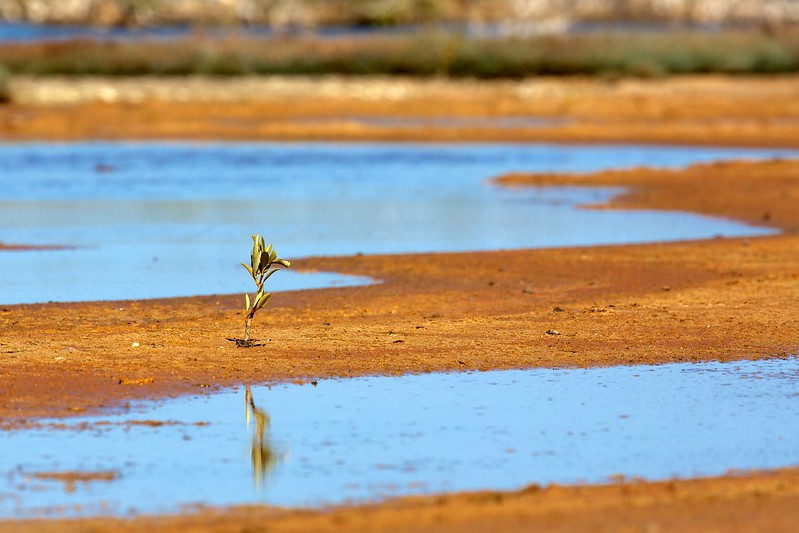Sea country, climate change and Indigenous knowledge
Posted By Mibu Fischer on February 21, 2022 @ 12:30

Extending beyond Australia’s 30,000 kilometres of coastline are millions of hectares of ‘sea country’, which encompasses the flora and fauna, beliefs and cultural practices of the many Indigenous groups that care for these areas. The Australian coastline has receded over the past 35,000 years, with an estimated two million hectares inundated as climate systems changed. This land, though now submerged, still has significant cultural connections for many traditional custodians.
Aboriginal and Torres Strait Islander peoples hold the knowledge of past responses to climate change, but our ability to continue to add to this body of knowledge is limited.
Past generations were able to freely move and adapt to a changing climate. Today, many Aboriginal and Torres Strait Islander communities that are being impacted and will continue to be impacted by climate change rely on Western management systems, imposed through colonisation, to address the issues they face. On the island of Masig in the Torres Strait, storm surges, higher king tides and rising sea levels are inundating roads, graveyards, freshwater supplies and homes. With current sea-level rise in the region at 6–8 millimetres per year, some islands are likely to become uninhabitable.
The impacts on communities are likely not to end there. The indirect impacts—as a result of ocean acidification, temperature increases on the sea surface and species redistribution—will influence traditional and economic resources, along with culturally important species and practices.
In northern Australia, it’s predicted that cultural species such as turtles will suffer nesting site loss due to sea-level rise. Even where nests survive, ocean temperature increases will result in a skewed gender ratio among hatchlings, with the potential for all-female populations in some nesting areas. Among human populations, there will be direct impacts on health from increased heat stress and spread of disease, such as mosquito-borne illnesses.
In the south, the Tasmanian Aboriginal shell-stringing community is already noticing changes to the culturally important species of maireener shells. Western-led scientific studies are yet to confirm whether these changes are linked to climate change, but increased ocean acidification is a likely driver. Decreased abundance and increased shell brittleness may also be caused by increasing ocean temperatures and a reduction in kelp beds due to habitat destruction from invasive sea urchins.
One of the biggest unknowns is the effect that increased storm surges, cyclones and rising tides will have on Australia’s coastlines. Climate change and other human activities are reducing the capacity of natural coastal defence systems—such as seagrass meadows, mangroves, saltmarshes, dunes, beaches, shellfish reefs and coral reefs—to protect our shores. Many communities will lose significant cultural sites and species, resources, spiritual connections and food sources. This will have numerous flow-on effects, including impacts to mental health and wellbeing.
The recognition of Indigenous knowledge and traditional ecological knowledge as a science is increasing among natural resource scientists, researchers, managers, practitioners and policy partners, especially since the Black Summer bushfires of 2019–20. While appreciation of the effectiveness of traditional firestick fire-management techniques is expanding across the country, the idea that this knowledge also extends beyond our shores and into our coastal and marine environments is still new for many. In a recent survey [1], most marine scientists who responded acknowledged the importance of Indigenous engagement, but many were unsure of how to weave it into their research practices.
There are some important considerations for researchers, practitioners and policy partners who want to include an Indigenous perspective in their work. Perhaps foremost among these is reframing the idea that traditional custodians are stakeholders who need to be engaged in addition to and in the same way as other stakeholder groups. Aboriginal and Torres Strait Islander peoples are rights and title holders under international and national frameworks and legislation such as the UN Declaration on the Rights of Indigenous Peoples and the Commonwealth Native Title Act 1993. The engagement of Aboriginal and Torres Strait Islander communities needs to reflect these rights and involve traditional custodians in the earliest project stages. Included in these rights is the principle of ‘free, prior and informed consent’, which is considered standard practice for Indigenous communities.
There’s a move towards co-designed and Indigenous-led marine and coastal management. This shift is about balancing the power dynamics and knowledge governance between traditional custodians and government departments, organisations and researchers. The inclusion and use of Indigenous knowledge frameworks are one way to empower and weave Indigenous rights and knowledge into marine and coastal management arrangements. Internationally, the ‘Two-eyed seeing’ or Etuaptmumk (in Mi’kmaw) framework as explained by Mi’kmaw Elder Albert Marshall is an example of an Indigenous framework that has been used in research. It is a guide to seeing through one eye with strengths and ways of knowing from the Indigenous lens, seeing through the other eye with the strengths of Western ways of knowing and then using both eyes together to find benefits for all. In Australia, the eight-ways pedagogy framework [2] has been used by some scholars.
Aboriginal culture is the longest continuous culture on earth. This continuity means that Aboriginal and Torres Strait Islander cultures are living and can change in response to interactions with different societies, environmental factors, new technologies, changing political beliefs and new discoveries. Adequate weaving of Indigenous knowledge in marine and coastal management must involve Aboriginal and Torres Strait Islander processes and protocols and move beyond only including Indigenous knowledge as content.
Article printed from The Strategist: https://www.aspistrategist.org.au
URL to article: https://www.aspistrategist.org.au/sea-country-climate-change-and-indigenous-knowledge/
URLs in this post:
[1] recent survey: https://www.nespmarine.edu.au/system/files/Hedge%20et%20al%20Perceptions%20%2C%20motivations%20and%20practices%20for%20Indigenous%20engagement_2020_OPEN.pdf
[2] eight-ways pedagogy framework: https://www.8ways.online/
Click here to print.